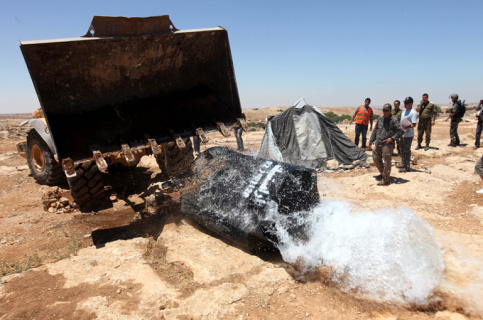
On May 25, Al-Haq sent letters to several corporations highlighted in Al-Haq’s upcoming report on corporate complicity in denying Palestinian’s access to and pillaging water resources in the Occupied Palestinian Territory, in violation of Palestinians’ right to self-determination and permanent sovereignty over natural resources. Merkorot Water Company Ltd., Hagihon Company, TAHAL Group International B.V., Hyundai, Caterpillar Inc., JC Bamford Excavators Ltd., and Volvo Car Group were contacted about their feature in the report and were extended the opportunity to provide comment about their active compliance in the dispossession of Palestinian water sources and restriction of Palestinian water access.
Al-Haq’s report details how corporations increasingly enable Israel’s appropriation of water by sustaining the ongoing dispossession of the already restricted water access to Palestinian communities. For example, Mekorot, Israel’s national water company, extracts an amount of water from the OPT that exceeds the usufruct rule of the Hague Regulations and is, thus, in violation of international humanitarian law (IHL).[1] By illegally appropriating large water quantities from Palestinians, Mekorot’s actions may amount to the war crime of pillage.[2] Mekorot’s drilling of illegal wells, along with TAHAL’s infrastructural support, serves illegal Israeli settlements with an unlimited supply of water, while simultaneously restricting water supply for Palestinian communities in the same region. This sustains the transfer of a foreign population into the OPT, constituting a violation of Article 49 of the Fourth Geneva Convention.[3] Through these actions, Mekorot, and many other corporations, blatantly violate Palestinians’ means of subsistence, a violation of Article 1(2) of the International Covenant on Civil and Political Rights and Article 1(2) of the International Covenant on Economic, Social and Cultural Rights.[4]
Corporations have an obligation to respect the rights of individuals and communities to water and other natural resources. In accordance with international law and the UN Guiding Principles on Business and Human Rights, all corporations operating in the OPT must comply with IHL and international human rights law through the cessation of all business in illegal Israeli settlements and establish policies that seek to prevent human rights violations during their operations and trade.[5] In conflict affected areas, such as the OPT, businesses are required to practice enhanced due diligence in understanding their impact on and ensuring compliance with human rights, as established by international law.[6] A company that benefits from the opportunities or environment created by human rights violations, even indirectly, may be found complicit in those violations.
Several of the corporations named in the report include, in their company policies, a commitment to respecting human rights and avoiding causing or contributing to adverse human rights impacts,[7] which is of grave concern considering their complicity with the extensive destruction and appropriation of Palestinian water property and through the active removal of Palestinian’s preservation of water.
The overall objective of Israel continues to be the expropriation of Palestinian land and resources to manipulate and engineer the demographic composition by transferring Palestinians to create and expand Jewish settlements on both sides of the Green Line. It is through this objective that widespread and systematic human rights violations against the Palestinian people, while fragmenting the West Bank and isolating it from Jerusalem, and rendering sustainable and independent social and economic development for Palestinians in the OPT impossible to achieve. These acts have been condemned as apartheid by the UN Special Rapporteur for the Occupied Palestinian Territory, Michael Lynk.[8] Al-Haq’s upcoming report details how the private sector, particularly the companies listed above, enable Israel’s apartheid regime, in blatant violation of the binding and customary provisions of the Apartheid Convention, acts which may further amount to crimes against humanity under the Rome Statute of the International Criminal Court.[9]
Al-Haq calls upon the corporations listed above, and all corporate actors doing business in the OPT, to act with enhanced due diligence to avoid further involvement in serious human rights violations and war crimes in the OPT. Al-Haq calls on the corporations involved to comment on their actions within the OPT, and to comply with their responsibilities under international law, including disengagement.
[1] Articles 52, 53 and 55 of the Hague Convention (IV) Respecting the Laws and Customs of War on Land and Its Annex: Regulations Concerning the Laws and Customs of War on Land, 18 October 1907
[2] Article 8(2)(b)(xvi) of the Rome Statute.
[3] Article 49, Geneva Convention Relative to the Protection of Civilian Persons in Time of War, 12 August 1949.
[4] UN General Assembly, International Covenant on Civil and Political Rights, 16 December 1966, United Nations, Treaty Series, vol. 999, p. 171; UN General Assembly, International Covenant on Economic, Social and Cultural Rights, 16 December 1966, United Nations, Treaty Series, vol. 993, p. 3.
[5] The UN Guiding Principles on Business and Human Rights (2011), available at <https://www.ohchr.org/sites/default/files/documents/publications/guidingprinciplesbusinesshr_en.pdf>
[6] Due diligence requires the monitoring, identification, assessment, prevention and minimization of human rights violations by business activities. UN Guiding Principles, Guiding Principle 13, 17 and 18.
[7] Volvo’s Human Rights Policy, for example, states that it will utilize its Responsible Sales process to avoid its products “being used or involved in instances of violations of human rights in conflict and other high-risk contexts.”[7] Given that the OPT is a situation of military occupation, Volvo must cease its activity in the OPT, in accordance with its internal policies and values.
[8] United Nations, “Israel’s 55-year occupation of Palestinian Territory is apartheid – UN human rights expert” (25 March 2022), available at: < https://www.ohchr.org/en/press-releases/2022/03/israels-55-year-occupation-palestinian-territory-apartheid-un-human-rights>
[9] UN Committee on Economic, Social and Cultural Rights (CESCR), General Comment No. 15: The Right to Water (Arts. 11 and 12 of the Covenant), 20 January 2003, E/C.12/2002/11.

